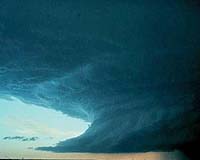NASA scientists have developed a new climate model that indicates that the most violent severe storms and tornadoes may become more common as Earth's climate warms.

Clouds over North America on August 2,
2000, as measured by GOES-11. (Credit: NASA/NOAA)
Previous climate model studies have shown that heavy rainstorms will be more common in a warmer climate, but few global models have attempted to simulate the strength of updrafts in these storms. The model developed at NASA's Goddard Institute for Space Studies by researchers Tony Del Genio, Mao-Sung Yao, and Jeff Jonas is the first to successfully simulate the observed difference in strength between land and ocean storms and is the first to estimate how the strength will change in a warming climate, including "severe thunderstorms" that also occur with significant wind shear and produce damaging winds at the ground. Read More









